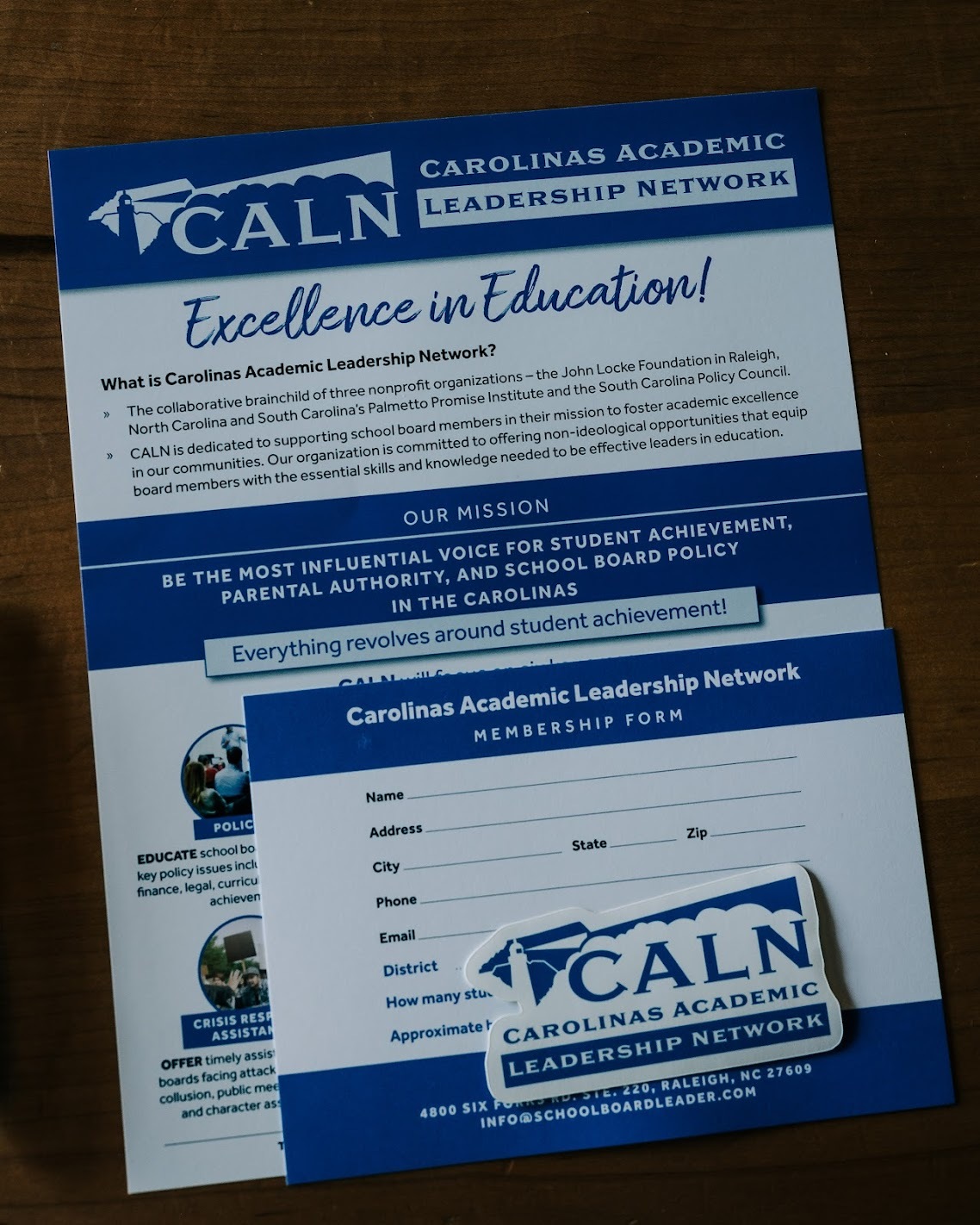- "The founders understood that the Lockean natural rights of life, liberty, and property could only be preserved by educated people. Still, they also knew the corrupting threat to the republic posed by sprawling bureaucracies," said Foxx.
A new initiative designed to train and support local school board members in North and South Carolina kicked off in Charlotte Thursday. The Carolinas Academic Leadership Network (CALN) aims to foster a commitment to student achievement, parental empowerment, and academic excellence among school board members and prepare them with the tools to effectively improve student achievement in their districts.
CALN was created by John Locke Foundation, in partnership with the Palmetto Promise Institute and the South Carolina Policy Council.
At the Charlotte kickoff, Brigadier General (ret.) Mitchell Zais, who served as superintendent for the state of South Carolina and later as the acting Secretary of Education under former President Donald Trump, was the keynote speaker. Zais highlighted several topics he believes school administrators, teachers, school board members, and parents can use as valuable educational resources. He focused his comments on the impact of poverty on student learning outcomes, school budgets and finance, public school staffing and student enrollment, and key courses of action for school board members.
North Carolina Congresswoman Virginia Foxx, South Carolina Congressman Ralph Norman, South Carolina State Senator Wes Clymer, and Dr. Terry Stoops, Director of Academically Successful and Resilient Districts (ASRD) for the Florida Department of Education shared ways to improve the education system at both the federal and state levels.
Foxx, who represents North Carolina’s 5th Congressional District and serves as Chair of the House Education Committee, said the federal government should be less involved with educating America’s children, favoring more local oversight and approach.
“If I could, I would get us out of education in a heartbeat,” she said. “I think the decision by the founders to exclude the federal government from education was a prudential one made with great care and great insight. The founders understood that the Lockean natural rights of life, liberty, and property could only be preserved by educated people. Still, they also knew the corrupting threat to the republic posed by sprawling bureaucracies and unitary decision-making, and that’s what we have right now. That threat is more present than ever.”
Carolina Journal spoke with Congressman Norman, who stressed the importance of the CALN initiative.
“CALN is needed now more than ever because we’re losing our younger generation,” he said. “They’re willing to put the time and the talent towards mentoring young people and making sure they’re prepared to compete in a world that is challenging, to say the least. It’s an honor for me to get involved and an honor for me to be here.”
“If we can’t stand up for our children, what can we stand up for?” said Norman during his remarks.
He spoke about defunding and downsizing the bureaucratic National Education Association (NEA) due to its large budget and staff, among other issues with the labor union, which has produced substandard student outcomes. He also advised attendees to become involved at the local level by being informed on the policy and organization of local school districts.
Dr. Stoops also addressed today’s education climate during the event. He formerly served as Director of Locke’s Center for Effective Education and has written extensively on North Carolina education policy solutions.
CJ also spoke with Sean Strain, a former school board member for the Charlotte-Mecklenburg School District, about his impressions of the event and how to apply the lessons learned moving forward.
“The organization that is being created here and, more importantly, the program is really about a student-centric and mission focus so that the organization is focused on making sure that we’re educating and preparing kids, said Strain. “That is what came through in spades in this program is how you go about, as leaders in education, making sure that we are achieving the objectives and holding the organizations to account whether financially or just by performance metrics and measurement, establishing at every level that we are executing per our mission and people are performing at a level they need to.”
The objectives put forth in the program apply across the board to all school districts regardless of their size and are analogous to concepts involved in any business operation, according to Strain.

“This sentiment applies full stop in any school district,” he said. “These are effectively business principles around performance and accountability that almost never get applied to government institutions. The argument for years, as I sat on the board, was whether those principles applied, and of course, they do because what we are talking about is creating a high-performing organization that delivers its mission for its clients. Our clients are our families and, specifically, our children. When we’re not holding people to account, whether it’s the teacher, the bus driver, the Superintendent, or individual board members for advancing that, we are failing our kids.”
In a statement emailed to CJ, former Locke CEO Amy Cooke believes the initial kickoff was a resounding success.
“Judging from the conversation and questions, I think we’ll look back on this evening as the day a group of committed North and South Carolina school board members prioritized student achievement, academic excellence, and parental involvement. I’m incredibly proud of this project and the three groups that came together to make it happen,” she said.





